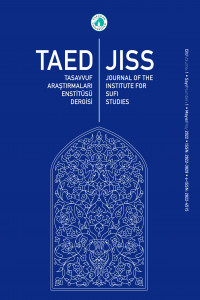Mânevî Yoksulluk – Göksel Zenginlikler: İbn ‘Arabî ve Rûmî’nin Öğretilerinde Fakr Üzerine Bazı Düşünceler
Bu makale, tasavvufun iki büyük muhakkiki olan Muhyiddîn İbn ‘Arabî (ö. 638/1240) ile Mevlânâ Celâleddîn-i Rûmî’nin (ö. 672/1273) eserlerinde fakr (mânevî yokluk, Allah’a muhtaç olma) kavramına yönelik bir inceleme niteliğindedir. İsmâil Hakkı Bursevî’nin, İbn ‘Arabî’nin üvey oğlu ve vârisi olan Sadreddîn Konevî (ö. 672/1274) ile Mevlânâ arasında Konya’da geçen bir görüşmeye dair aktardığı bir hikayeden yola çıkarak, gönüllü yoksulluğun mânevî ilkeleri ile bütün varlıkların sahip olduğu ve İnsân-ı Kâmil’de tam manasıyla açığa çıkan hakiki ruhsal yoksulluğu karşılaştırma amacını taşır. Ayrıca ontolojik yoksulluğu, ilâhî lütfa hamd ve şükrün zeminini teşekkül ettiren bir unsur olarak ele alır.
Anahtar Kelimeler:
Tasavvuf, İbn ‘Arabî, Rûmî, Konevî, fakr, mânevî yoksulluk, insân-ı kâmil, Fütûhâtü’l-Mekkiyye, Sufism, Ibn ʿArabi, Rumi, Qunawi, faqr, spiritual poverty, perfect human being, al-insān al-kāmil, Futuhat al-Makkiyya
Spiritual poverty – heavenly riches some reflections on faqr in the teachings of Ibn ʿArabi and Rumi
This paper is an examination of the notion of faqr (poverty, neediness) in the writings of two of the greatest exponents of Sufism as realisation of Truth (tahqīq), Muḥyī al-Dīn Ibn ʿArabī (d. 638/1240) and Jalāl al-Dīn Rūmī (d. 672/1273). It draws on a story told by Ismail Hakkı Bursevi regarding a meeting between Ibn ʿArabī's stepson and heir, Ṣadr al-Dīn al-Qūnawī (d. 672/1274), and Rumi in Konya, and contrasts the spiritual principles of voluntary poverty with the true poverty of spirit, which all beings participate in and which is fully known and experienced in the perfect human being. It also looks at the way essential poverty is described as the fundamental underpinning of praise and the celebration of Divine bounty.
Keywords:
Sufism, Ibn ʿArabi, Rumi, Qunawi, faqr, spiritual poverty, perfect human being, al-insān al-kāmil, Futuhat al-Makkiyya,
___
- From Sunday morning prayer by Ibn ʿArabi in Awrād al-usbūʿ, ed. and trans. Stephen Hirtenstein and Pablo Beneito as Prayers for the Week: the Seven Days of the Heart (Oxford, 2021), p. 34 and Arabic p. 7.
- Mathnawi, Book 1, 2846, from Rumi, Spiritual Verses (Penguin 2006), trans. Williams, p. 263.
- ISSN: 2822-3829
- Başlangıç: 2022
- Yayıncı: Üsküdar Üniversitesi
Sayıdaki Diğer Makaleler
Bursalı Safiye Hanım ve Mi’râciyye Vakfiyesi
Tasavvuftan Felsefeye: Toshihiko Izutsu ve Tasavvuf
Türk Edebiyatında Manzum Tasavvuf Tarifleri: Tasavvuf-nâmeler
Niyâzî-i Mısrî Dîvânı’nda “Anlar Bizi” Redifli Gazelin İdrâk Yönünden İncelenmesi
Ekberî Gelenekte Tasavvuf ve Aklî Tahkîk
Hz. İbrâhîm’in Dini: İbrâhimî Hakîkat Üzerine Sûfî Görüşler
